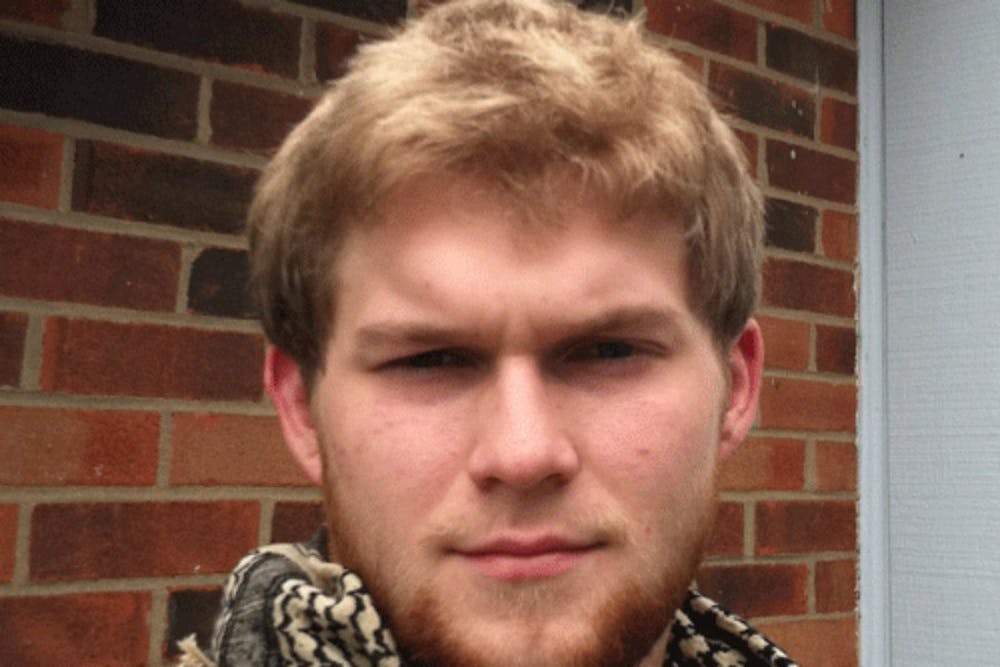Andrew Salsman
By Libby Mueller, Senior Staff Writer
Miami University planted an oak tree in front of Kreger Hall Monday, Oct. 20 at 1:15 p.m., in memory of Andrew Dalton Salsman, an MU sophomore who committed suicide last December. A plaque will be placed at the spot later in the year.
Salsman's family and friends, the Dean of Students and members of the Physics department will attend the dedication. Salsman was a Physics Department Research Assistant and R.L. Edwards Physics Scholarship recipient.
Salsman's mother, Lynn Anderson, said Salsman was extremely intelligent. He had a double major in Physics and Math and a curious mind.
"He was very bright," Anderson said. "He would do things just for fun like memorize the periodic table of the elements. He would take a Rubix Cube and solve it in 30 seconds."
Salsman was also well-rounded. He had an interest in and a talent for many different things.
"He tended to be involved in sports that were more individual, like Tae Kwon Doe. He was a brown belt," Anderson said. "The other thing was, he loved to cook. He was an excellent chef. He loved to experiment in the kitchen and he even taught me a few things."
But Salsman suffered from debilitating anxiety and obsessive-compulsive disorder (OCD) that prevented him from enjoying the things he loved most.
"His was not the typical OCD," Anderson said. "His was more in his head, ideas that would loop that he couldn't get away from."
Anderson said it became clear after Salsman's death, from looking back through texts and notes, that he had been planning his suicide for months and using his intellect to conceal his plans.
After her son's death, Anderson started a nonprofit suicide prevention organization called 2 Live On, dedicated to those like Salsman who do not want to be stopped from committing suicide.
"The Center for Disease Control (CDC) did a study and found that 70 percent of those who attempt to commit suicide tell someone first and that's a good sign," Anderson said. "They're the type who might call a hotline or talk to friends and give overt clues, but that leaves 30 percent who don't do that and Andrew was one of those. I think hotlines and active help do assist a number of students, but others it's not reaching at all, so we need something different."
According to Anderson, her organization 2 Live On is committed to discovering a way of reaching that 30 percent. One of the ways she has identified is fighting for insurance coverage of prescription drugs that help those suffering from mental health conditions. Another way is reducing the stigma on mental health issues because the majority of the people who commit suicide have had a mental health diagnosis.
"There's still such a huge stigma against mental illness," Anderson said. "People don't want to be looked at differently or made fun of. I think more people are talking about it, but if we can reduce the stigma we can really help people."
Senior Julie Mullen said even though she never had suicidal thoughts, she did wrestle with anxiety. She believes it is important to talk about mental health issues and fight the stigma as a community.
"When you struggle with a mental health issue, it feels shameful," Mullen said. "We should work to reduce the taboo so it feels less heavy to people who are struggling with it."
Simply talking about mental health issues can bring relief and hope, she said.
"To people who are struggling with mental health issues, one of the key things is to bring it to the light and tell people you're struggling with it," Mullen said. "You'd be surprised how many people can relate. And to people who have seen victory, it's important to tell that story, to show there's hope."
Mullen said she has triumphed over the anxiety that used to be crippling. She said seeing counselors, talking about the struggle and analyzing herself and the contributors to the anxiety all helped ease the burden.
Director of the Student Counseling Service (SCS) Kip Alishio said talking with friends or family can also help people who are having suicidal thoughts. According to Alishio, it is important to recognize the signs of someone who is thinking about suicide and immediately address them.
"Some of the warning signs are somebody who mentions that they're thinking about killing or hurting themselves or someone who talks or writes about death, dying or suicide," Alishio said. "Other signs are an expressed sense of hopelessness, uncontrollable anger or increased alcohol or drug use. If anybody suspects a friend or acquaintance or family member may be struggling with thoughts, the thing to do is to ask directly and nonjudgmentally and not be afraid to do so. It can be a relief because talking about it helps to make a connection and instill a sense of hope."
MU provides resources including SCS, the Psychology Clinic, apps and hotlines. The Just In Case cell phone app can be downloaded from the SCS website and has information about suicide warning signs and prevention. The Butler County Crisis Hotline at 1-844-427-4747 is available 24/7.
There are resources and help available to students having suicidal thoughts, and there is always a reason for hope - even for students who feel as if there is no way out, Anderson said.
"There is never a problem or heartache or issue that can't be solved by continuing to live and seeking help and looking for other solutions," she said. "Suicide puts an end to all other options and it doesn't have to be that way. There is help if people reach out and ask for it. The road may be hard and long but eventually they'll get there if they don't give up."

